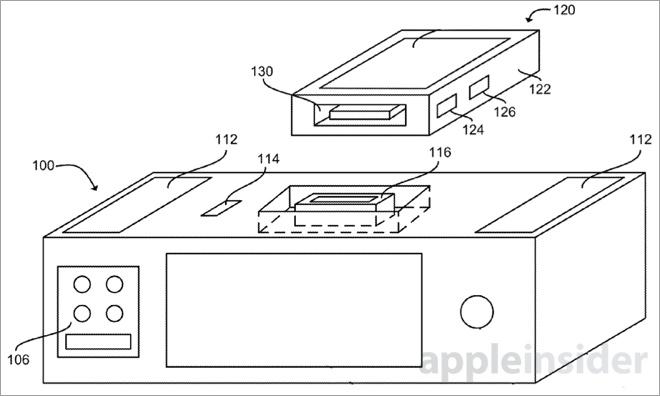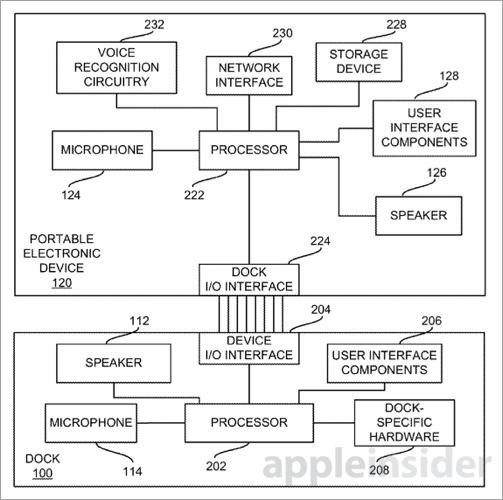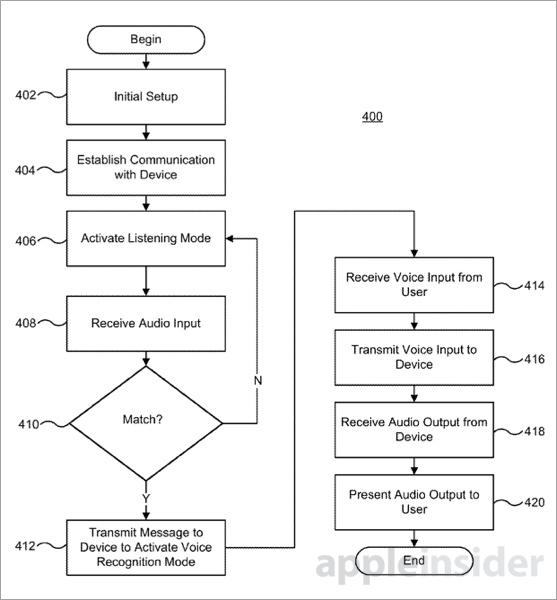The U.S. Patent and Trademark Office on Thursday published an Apple patent application detailing a full-function "smart dock" that continually listens for cues to activate and communicate with the voice recognition functions of docked devices, like the iPhone and iPad.
Apple's "Smart dock for activating a voice recognition mode of a portable electronic device" filing clearly describes an iOS device accessory unlike anything the company has manufactured. Like third-party peripherals, Apple's proposed dock can include a speaker, microphone and built-in screen, but goes further by allowing access to the Siri virtual assistant.
Currently, Apple's only docking solutions for both the iPhone and iPad are limited to charging and line-out audio. In contrast, the proposed dock would have a screen, tactile controls or a touch panel with which a user can interface. Other embodiments include a scroll wheel, buttons and other manual controls.
Instead of carrying Siri onboard, the dock would be mostly headless until an iPhone or iPad was operatively coupled to the unit. Basic functionality like a clock and radio are provided, but voice recognition and heavy processing are accomplished by the iOS device.
Basically, the dock listens for a specific prompt, recognizes an activation request by the user, relays commands to the docked iPhone and executes any operations returned by the device. Examples could be playing a song or facilitating communication between the user and Siri.
In operation, a user would perform an initial setup that would include assigning an audio prompt, such as a spoken word or hand clap, that will be used to activate the unit and its services. For example, a user may want to set the prompt as a finger snap. When in listening mode, if the dock "hears" a finger snap, it will activate the iPhone's voice recognition feature.
By setting listening thresholds, the dock can selectively filter out ambient noise while still allowing a user to operate their device remotely using only audio cues. Since the system relies primarily on audio input, an effective limiter must be implemented to ignore responses by Siri. In these scenarios, the dock would deactivate listening mode during voice recognition operations.
Internal components include a wireless communications module for accessing off-site databases and Internet assets like webpages or cloud storage. If, for example, a user wanted to change their schedule for the day, they could initiate Siri via the always-listening dock and modify a calendar stored in iCloud.
In addition to the built-in hardware, the dock can also be fitted with add-ons like a removable hard drive, environmental sensors, a GPS module and more. Some embodiments allow for the dock and iOS device to be paired but uncoupled, meaning the dock would transform into a sort of smart wireless speaker system.
Finally, users can force the dock to deactivate Siri by issuing a verbal command or other audio input. Alternatively, the dock itself can time out Siri voice recognition and put the iOS device to sleep after a predetermined time period. There is also a provision for wireless inductive charging.
Apple's smart dock patent application was first filed for in May 2012 and credits Scott Krueger, Jesse Dorogusker and Erik Wang as its inventors.
 Mikey Campbell
Mikey Campbell









-m.jpg)






 Marko Zivkovic
Marko Zivkovic
 Mike Wuerthele
Mike Wuerthele
 Christine McKee
Christine McKee
 Amber Neely
Amber Neely
 Sponsored Content
Sponsored Content
 Wesley Hilliard
Wesley Hilliard

 William Gallagher
William Gallagher









46 Comments
Google Now initiates on some Android phones by saying 'Google' without the requirement of a dock (horrid activation word, I know). 'Apple' would be horrid, too, but 'Siri' would sound appropriate. If Google can listen for the keyword without killing battery, why can't the iPhone?
Google = Google
Siri = A long way, for the majority to single out Apple.
Google Now initiates on some Android phones by saying 'Google' without the requirement of a dock (horrid activation word, I know). 'Apple' would be horrid, too, but 'Siri' would sound appropriate. If Google can listen for the keyword without killing battery, why can't the iPhone?
Don't see why we can't set our own keyword. If I want to shout "hey buttwad" to activate Siri, that's my choice.
I think the MotoX, which does the "listening in" most effectively has a dedicated chip, a bit like the M7 is for exercise; so the main processor isn't active which saves power. Maybe something similar for the iPhone 6?
Ok, Glass with champagne is what I raise with this patent. Though I don't understand why I would need to dock my iPhone. Apple is all about wireless, I thought. Maybe they want us to dock a 12.9" device.
[quote name="PhilBoogie" url="/t/161055/apples-smart-dock-would-give-siri-a-permanent-place-in-the-home#post_2443603"]Ok, Glass with champagne is what I raise with this patent. Though I don't understand why I would need to dock my iPhone. Apple is all about wireless, I thought. Maybe they want us to dock a 12.9" device.[/quote] On a tangential thought here ... How far off can Siri for OS X be I wonder?